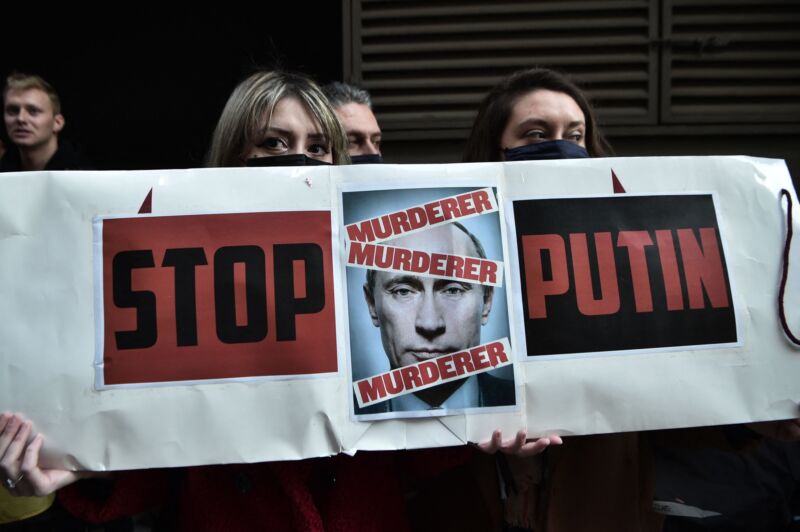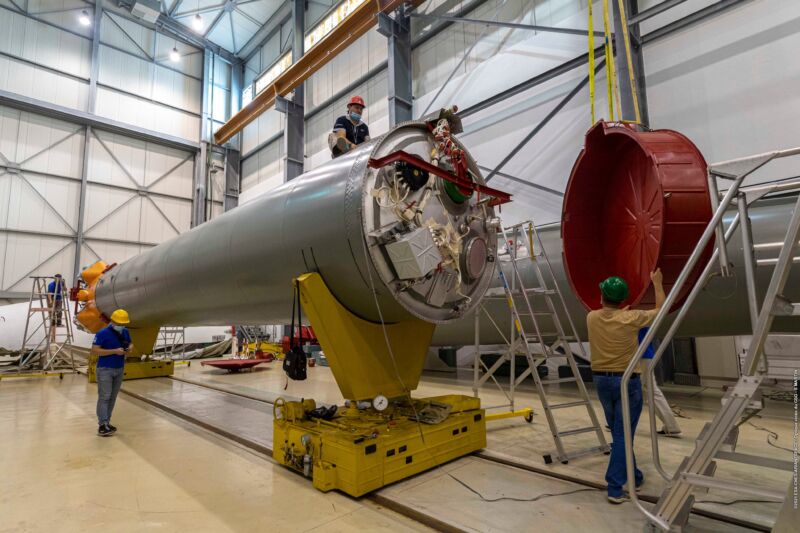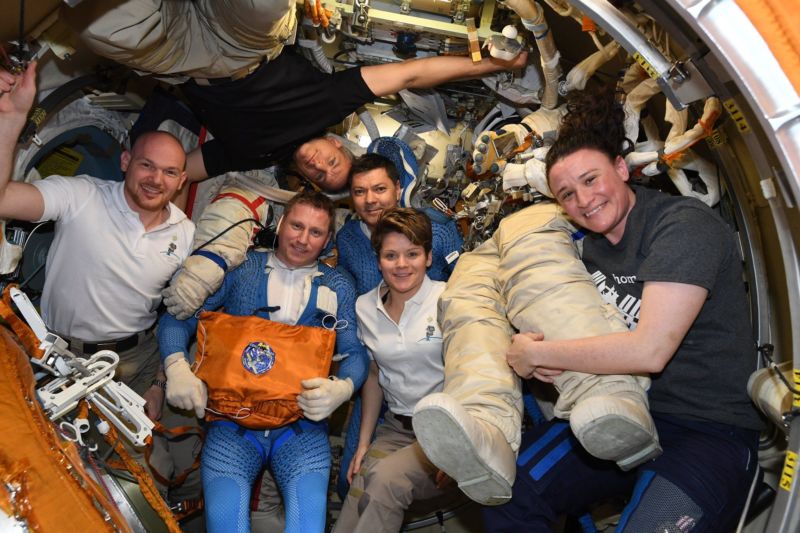US and allies block tech exports to Russia in response to invasion of Ukraine
Export ban affects chips, telecom, encryption tech, lasers, sensors, and more.

"In response to Russia's invasion of Ukraine, the US and allies are imposing sanctions that "will cut off more than half of Russia's high-tech imports, restricting Russia's access to vital technological inputs, atrophying its industrial base, and undercutting Russia's strategic ambitions to exert influence on the world stage," the White House said on Thursday. The sanctions are a "response to Putin's war of choice against Ukraine" and "impose severe costs on Russia's largest financial institutions," the White House said.
For exports to Russia, "US companies must now obtain licenses to sell computers, sensors, lasers, navigation tools, and telecommunications, aerospace, and marine equipment. The United States will deny almost all requests," a Reuters article explained. "The new rules also force companies making tech products overseas with US tools to seek a US license before shipping to Russia," Reuters wrote, noting that similar restrictions were previously applied to Chinese tech giant Huawei.
According to the White House announcement, "countries that adopt substantially similar export restrictions are exempted from new US licensing requirements for items produced in their countries." The European Union, Australia, Japan, Canada, New Zealand, and the United Kingdom are imposing similar sanctions.
Tech-specific export restrictions
Tech-specific sanctions target chips, telecom, security, and more, the White House said:
Russia-wide restrictions to choke off Russia's import of technological goods critical to a diversified economy and Putin's ability to project power. This includes Russia-wide denial of exports of sensitive technology, primarily targeting the Russian defense, aviation, and maritime sectors to cut off Russia's access to cutting-edge technology. In addition to sweeping restrictions on the Russian-defense sector, the United States government will impose Russia-wide restrictions on sensitive US technologies produced in foreign countries using US-origin software, technology, or equipment. This includes Russia-wide restrictions on semiconductors, telecommunication, encryption security, lasers, sensors, navigation, avionics and maritime technologies. These severe and sustained controls will cut off Russia's access to cutting edge technology.
Regarding military-specific restrictions, the White House said that "Exports of nearly all US items and items produced in foreign countries using certain US-origin software, technology, or equipment will be restricted to targeted military end users. These comprehensive restrictions apply to the Russian Ministry of Defense, including the Armed Forces of Russia, wherever located."
A Commerce Department fact sheet on the license rules said the US is imposing "a policy of denial" for license applications but will conduct case-by-case reviews for "applications related to safety of flight, maritime safety, humanitarian needs, government space cooperation, civil telecommunications infrastructure, government-to-government activities, and to support limited operations of partner country companies in Russia."
Tough sanctions on Russian banks
The Biden administration said it is "cutting off Russia's largest bank from the US financial system" and imposing "full blocking sanctions on Russia's second largest bank—freezing any of its assets touching the US financial system." There are also "full blocking sanctions" on three other major Russian financial institutions and certain "Russian elites... who have enriched themselves at the expense of the Russian state, and have elevated their family members into some of the highest position of powers in the country."
The US Treasury Department posted more details on the financial sanctions here.
Meanwhile, Russia's invasion of Ukraine could cause problems for chip manufacturing. "Ukraine is a major producer of neon gas critical for lasers used in chipmaking and supplies more than 90 percent of US semiconductor-grade neon, according to estimates from research firm Techcet," Reuters reported. "About 35 percent of palladium, a rare metal also used for semiconductors, is sourced from Russia. A full-scale conflict disrupting exports of these elements might hit players like Intel, which gets about 50 percent of its neon from Eastern Europe according to JPMorgan."
Russia pulls out of European spaceport, abandoning a planned launch
"We will take all relevant decisions in response to this decision."

Russia has decided to suspend cooperation with European launch officials, and says it will withdraw its personnel from Europe's main spaceport.
The chief of Russia's main space corporation, Dmitry Rogozin, announced the decision on Twitter Saturday morning, saying his country was responding to sanctions placed on Russia by the European Union. Europe, the United States, and other nations around the world issued significant sanctions on Russia this week after the country's unprovoked invasion of Ukraine.
Approximately two dozen Russian technicians and engineers work at Russian facilities in French Guiana. This spaceport, called the Guiana Space Center, is where Europe launches its fleet of orbital rockets, including a "Europeanized" version of the Russian Soyuz vehicle for medium-lift missions. The Russians had been working to prepare a Soyuz rocket to launch two Galileo satellites for the European Union on April 6.
Europe has spent $10 billion developing the independent Galileo navigation system, which now has more than two dozen satellites in orbit. The continent has also used the Soyuz vehicle to launch elements of its Copernicus network of Earth observation satellites.
In response to Russia's action, the European Commissioner for Space, Thierry Breton, issued a statement on Saturday that said there would be no consequences for the Galileo or Copernicus constellations in terms of continuity or quality of service. Nor, he said, would Russia's suspension of cooperation impact their development.
"We will take all relevant decisions in response to this decision in due course and continue developing resolutely the second generation of these two EU sovereign space infrastructures," Breton said. "We are ready to act decisively, together with the Member States, to protect these critical infrastructures in case of aggression, and continue to develop Ariane 6 and Vega C to ensure Europe's strategic autonomy in the area of launchers."
The Russian decision does put the European Union in something of a bind, however. Europe's small Vega rockets are not powerful enough to lift the Galileo and Copernicus satellites to their orbits. And the continent's heavy lift vehicle, Ariane 5, is being retired in favor of the more efficient and cost-effective Ariane 6 rocket. However, all of the remaining Ariane 5 launches are spoken for, and the Ariane 6 rocket probably will not become operational until at least 2023.
So it is not clear what steps Europe might take in the interim, should it need to rapidly launch a Galileo or Copernicus satellite. The only Western company with the spare capacity for such a mission is probably the United States-based SpaceX, but it seems unlikely that Europe would want to support a competitor to its institutional launch industry."
The Russian invasion of Ukraine will have myriad impacts on spaceflight
"If you block cooperation with us, who will save the ISS from an unguided de-orbit?"

Russia's unprovoked invasion of Ukraine this week will have devastating consequences for the people on the ground. Although the terrestrial implications of this war are far greater than those for spaceflight, there will nonetheless be ripple effects felt by space programs around the world.
During a speech on Thursday about US sanctions on Russia as a result of its invasion, President Joe Biden even mentioned space. "Between our actions and those of our allies and partners, we estimate that we’ll cut off more than half of Russia’s high tech imports and will strike a blow to their ability to continue to modernize their military," he said. "It’ll degrade their aerospace industry, including their space program."
So what does this mean? While it is very early in this crisis, this article will attempt to draw the broad outlines of how this conflict may impact spaceflight. As the situation is dynamic and the political landscape is tumultuous, please note that rapid changes are possible.
International Space Station
The most prominent space issue concerns the fate of the International Space Station, which is operated by 15 nations but led by the United States and Russia. The countries rely on one another: Russia provides fuel and thruster capability to periodically re-boost the space station to a higher altitude, and NASA gyroscopes provide stability, and its solar panels generate the vast majority of electricity. At present, the station cannot operate without the consent of both partners.
After Biden's comments on Thursday, the head of Russia's main space corporation, Dmitry Rogozin, lashed out in a series of tweets in which he characterized Biden's actions as "Alzheimer's Sanctions." A full translation of Rogozin's comments can be found here. In his rant, Rogozin complained about the loss of RD-180 engine sales ( the 01/01/2023 date), Elon Musk ("talented businessmen"), and other irritants. Rogozin also appears to assume that the US government will prevent NASA from working with Russia.
"If you block cooperation with us, who will save the ISS from an unguided de-orbit to impact on the territory of the US or Europe?" Rogozin asked. "There's also the chance of impact of the 500-ton construction in India or China. Do you want to threaten them with such a prospect? The ISS doesn't fly over Russia, so all the risk is yours. Are you ready for it?"
In response to these comments, NASA issued a measured response on Thursday evening, saying it was continuing to work with Russia and its partners to safely fly the International Space Station. "The new export control measures will continue to allow US-Russia civil space cooperation," the agency said. "No changes are planned to the agency’s support for ongoing in-orbit and ground station operations."
It remains in the interest of both NASA and Russia's space program to continue operating the space station. However, the situation could change in response to political pressure, particularly from the US Congress. . ."
READ MORE >> https://arstechnica.com/science/2022/02/the-russian-invasion-of-ukraine-will-have-myriad-impacts-on-spaceflight/


No comments:
Post a Comment